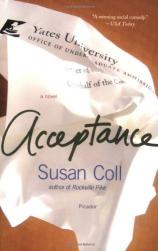Reading Group Guide
Discussion Questions
Acceptance

1. Grace is the first parent we meet in Acceptance. How does her household compare to the others in her neighborhood? Is Harry at a disadvantage by having been raised by a single parent?
2. Not all of Verona’s students are as academically driven as Harry. What separates the overachievers from the underachievers? Do either of these categories describe your experience in school?
3. What are the similarities between Harry’s and Taylor’s obsessions? As Harry becomes fixated on admission to Harvard and Taylor compulsively hoards mail, what insecurities are they soothing? What quirky obsessions would you admit to having?
4. How does Maya cope in the shadow of her high-achieving siblings? Why do her parents despise academic mediocrity? Can you picture Maya thriving as a college athlete?
5. How have attitudes toward college admissions changed since you were in high school? How did your school compare to Verona? What did your parents tell you about higher education?
6. In the seventh chapter (October), Harry runs into Lily Wong, who moved to an inner-city school district after a college counselor said she stood a better chance of getting into Harvard if she did “something to counter the smart Asian kid stereotype.” Does this scenario capture any realities?
7. Discuss the relationship between money and education described throughout the novel. What did money buy for the wealthiest families? Should Lily’s inner-city school receive the same amount of funding (per student) as Verona?
8. In your opinion, what does an SAT score measure? Would you pay for your child to receive the daily “test prep” recorded messages featured in the novel?
9. What makes the concept of college admissions competitiveness such a good target for spoofing? How is she able to blend humor with serious topics, and realism with the absurd? Which exaggerations were your favorites?
10. How is Maya’s outlook on success shaped by her summer in India? What had she believed about typical teenagers? Are the students depicted in the novel typical teenagers?
11. Nina insists that Taylor needs acceptance to a university where she will find a rich husband. Does a young woman’s key to success differ from a young man’s? How have college admissions standards changed since Nina was on the hunt for a spouse?
12. What is the effect of the sometimes elaborate background stories given for various characters, such as Basil Dickerson’s history at Enron, “overseeing the trading of charity futures”?
13. Discuss the satire of academia in Acceptance. After exercising so much power, why must Olivia remain an acting dean and compete in a recruitment search? Will she ever get to be truly in charge of anything? What are the honest answers to the applicants’ questions about getting into a top-tier school?
14. Taylor decides not to follow the considerable advice she receives regarding her application essay, and her decision to be frank almost keeps her out of college. What would have happened if she had crafted a “selling” essay for college admissions?
15. The Yashequana lawsuit recalls headlines about prestigious universities that now have to confront embarrassing aspects of their histories. How do the current goals of these universities compare to the principles on which they were founded?
16. What were your reactions to the novel’s ending? Which would have served Harry better: huge debt and a Harvard degree, or a free ride at the University of Maryland?
17. In the epilogue, Harry reads a statistic that implies it’s harder to get a job at Wal-Mart than to be admitted to Harvard. How does the competitive scenario described in Acceptance compare to life after college? To what degree do American universities resemble corporations?
Acceptance
- Publication Date: March 4, 2008
- Paperback: 320 pages
- Publisher: Picador
- ISBN-10: 0312426968
- ISBN-13: 9780312426965








